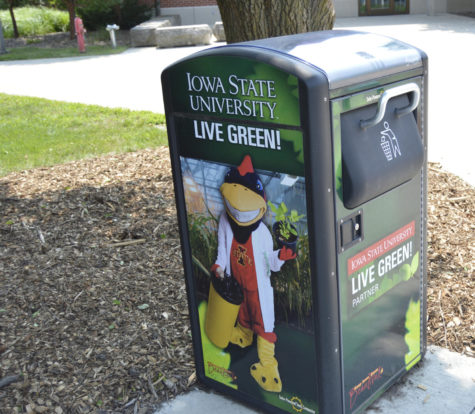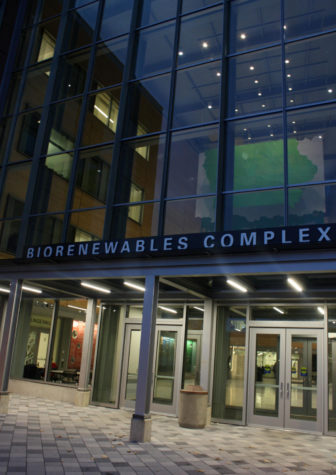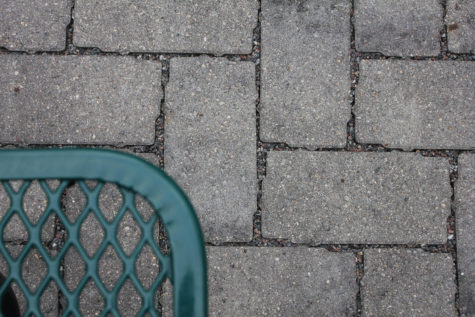President of Citizens’ Climate Lobby calls on Americans to help solve climate change
April 10, 2015
Marshall Saunders, founder and president of the Citizens’ Climate Lobby (CCL), spoke about the state of the declining climate Thursday, during a lecture in the Memorial Union.
“We have a very serious problem going on here with climate change, and warming and upsetting our natural systems,” Saunders said. “Climate change is bigger than ISIS and disturbed airline pilots.”
Saunders was one of 1,000 people selected by Al Gore to present his Climate Reality slideshow, but he soon realized that Gore’s solution wasn’t compatible with the problem. So in 2007, he created the CCL, a grassroots, nonpartisan organization meant to educate and support citizens as they lobby members of Congress.
“One of the most admirable things about [Saunders] is that he saw that there was a serious problem and dedicated his life to solving it,” said Stephen Briggs, assistant professor of philosophy.
Saunders said the public needs to be the ones who start the climate change conversation. By demanding more from politicians Americans can help “save the world,” Saunders said.
“Presidential candidates don’t want to talk about [climate change],” Saunders said. “We need to change that. If people get out and ask questions and don’t put up with phony answers, then you have a nice opportunity to put climate change at the head of the campaign where it belongs.”
Saunders believes people are not talking about climate change because it is too complex of a topic. That’s where CCL comes in. By providing people with hope they can get people to start the conversation, said Gregory Franck, co-leader of the Des Moines Chapter of CCL.
“When you take a few minutes and talk to people about [climate change] privately, they will say, ‘oh yeah, I am very worried about that,’ but until you ask them specifically about that they will talk about immigration or something else,” Saunders said.
One solution Saunders suggests is to put a fee on carbon. The CCL’s Carbon Fee and Dividend proposal calls for a fee of $10 per ton of carbon to be paid by the companies extracting the carbon from the earth. Each year, the fee will raise $10. The money collected from the fee will then be distributed to the American public, stimulating the economy. Not only will companies be fined if they extract carbon in the U.S., there will also be additional import fees for imports coming from countries without a carbon fee but companies will receive rebates if they export their product to countries without the carbon fee.
In a study conducted by Regional Economics Model Inc., it was found that by enforcing this fee, Co2 emissions would be 50 percent below the 1990 levels by 2035. Also, 2.1 million jobs would be created after 10 years and there would be a $70-80 billion increase of the GDP starting in 2020.
“Some of the members of congress and presidential candidates are saying it’s either the environment or the economy, that you can’t fix both of them. It turns out that never was true, only nobody ever paid for a study this big,” Saunders said.
Franck said the new economy that would be created would create new jobs in clean energy fields. The renewable energy, clean energy, solar energy and wind energy fields could all benefit because of the Carbon Fee and Dividend policy.
“A lot of people like to talk about jobs, jobs, jobs. That’s fine, lets talk about jobs, jobs, jobs, but they are in the new economy,” Franck said.
Saunders said the policy could aid in public health and 13,000 lives could be saved annually by implementing the policy.
According to the World Health Organization, pollution is the second leading cause of lung cancer in the United States.
In the past year, the CCL has had 1,047 meetings with members of Congress.
“Nobody else is doing that,” Saunders said. “To win this battle we need the greatest social achievement in history.”
Saunders said he is seeing a shift in the respect that the CCL is receiving from Congress. In the last few speeches they have given to congress were at “standing room only,” Saunders said.
The lecture was co-sponsored by the bioethics program, the Ames Chapter of CCL and the Committee on Lectures.









